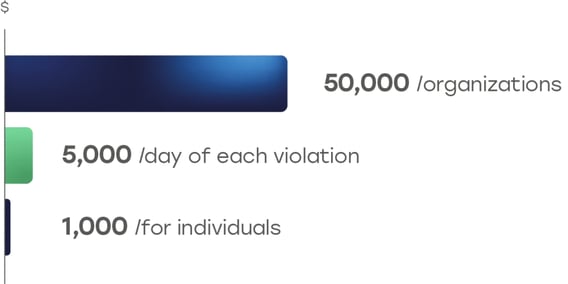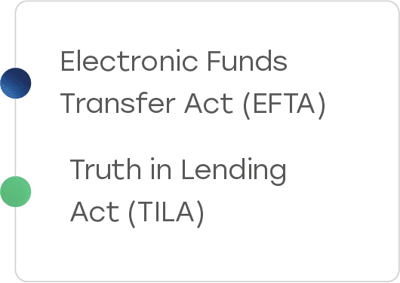
In our previous blog post, “Navigating Dual Pricing Regulations,” we explored the concept of dual pricing as a solution for businesses to streamline payment processes and reduce costs. Today, we delve deeper into the benefits of complying along with best practices to ensure compliance. By understanding and implementing these best practices, businesses can enhance profitability, build customer trust, and avoid potential legal issues or financial penalties. Let’s dive into the benefits of embracing compliant payment strategies and the key guidelines for achieving success.
Benefits of Dual Pricing Compliance
Avoiding Penalties
Compliance with regulations related to dual pricing is crucial for businesses to avoid legal issues and penalties. For example, violations of the Electronic Funds Transfer Act (EFTA) can result in fines of up to $1,000 per violation for individuals. For organizations, the fine is up to $500,000 per violation. Violations of the Truth in Lending Act (TILA) can result in fines of up to $5,000 per day for each violation. Additionally, businesses may be required to refund any overcharges to customers. Moreover, they would need to pay legal fees associated with a lawsuit or enforcement action.
Violation Fines


Building Trust with Customers
Compliance with regulations helps businesses build trust with their customers. Customers are becoming increasingly aware of pricing practices. They are more likely to do business with companies that are transparent and fair in their pricing. When businesses demonstrate their commitment to clarity and honest pricing practices, it increases customer satisfaction and loyalty. This leads to repeat business and positive word-of-mouth referrals. In addition, by providing clear and honest information about cash discounts, businesses can avoid misunderstandings and disputes with customers.

Maintaining a Good Reputation
Another benefit of compliance is it helps businesses maintain a good reputation, an important way for businesses to attract and retain customers. By complying with regulations related to cash discounts, businesses can also avoid negative publicity and word of mouth about their business.
Overall, compliance with regulations related to dual pricing is crucial for businesses to avoid legal issues, build trust, and maintain a good name. Compliance also helps businesses ensure that they’re treating customers equally, which leads to increased customer satisfaction and loyalty.

Best Practices for Dual Pricing |
3. Keep accurate recordsBusinesses should maintain accurate records of all dual pricing transactions, including the amount, the payment method, and any associated fees. This can help businesses demonstrate compliance with regulations if they’re audited or face any legal challenges. |
1. Provide clear and conspicuous disclosuresIt’s crucial that businesses clearly disclose the terms and conditions of dual pricing to customers in a way that’s easy to understand. This includes disclosing the amount of the discount, any fees associated with the payment method, and any other relevant information. A common way to do this is by having a dual pricing sign near the cash register, explaining the discount. 2. Ensure non-discriminatory pricingDual pricing should be applied equally to all customers, regardless of the payment method they choose. Businesses must avoid practices that discriminate against customers who make the choice to pay with credit. |
4. Train employeesEmployees should be trained on the rules and regulations related to dual pricing. This can help ensure that they understand how to apply discounts correctly and how to communicate with customers about the program. 5. Partner with a payment processorWorking with a payment processing partner can help businesses ensure compliance with regulations related to dual pricing. Payment processors can provide guidance on regulatory requirements and best practices for cash discount programs, as well as handle the technical aspects of implementing the program. |
By following these best practices, businesses can ensure that their dual pricing programs are transparent, fair, and compliant with regulations. This will help them avoid legal issues and penalties, build trust, and maintain a positive reputation.
Conclusion
In conclusion, compliance with dual pricing regulations is crucial for businesses offering this pricing strategy. Clear and conspicuous disclosures, non-discriminatory pricing, and accurate record-keeping are some of the best practices that businesses should follow to ensure compliance.
It’s important for businesses to work with a reputable payment processing company, such as Payarc, to ensure that they’re offering compliant dual pricing. Payarc's Dual Pricing program is designed to help businesses reduce transaction fees in a compliant manner, while also ensuring that customers are treated fairly and transparently. By working with Payarc, businesses can enjoy the benefits of offering dual pricing while avoiding legal issues and penalties.
For general inquiries, including partnership opportunities, please email: support@payarc.com

